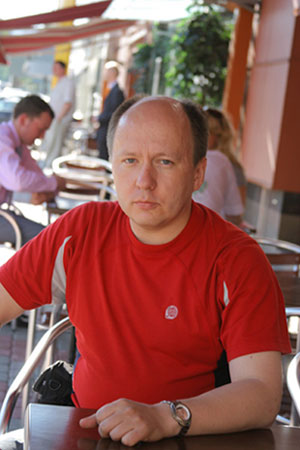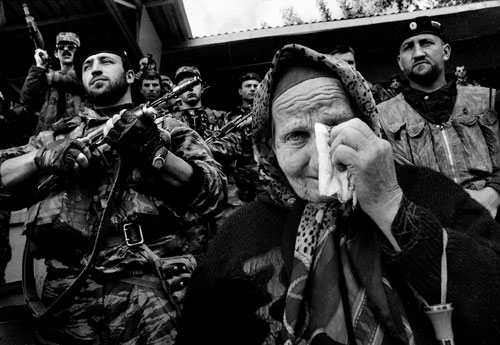
Artem Chernov is a photojournalist. We discover him through his path, between communism and post-communism, bitterness and exaltation he confides to actuphoto.com. The man who covered some conflicts and who saw his own Russia change gives his feelings about the future of photojournalism and his country.
Can you introduce yourself ?
I worked as a newspaper photojournalist from 1998 till 2006. This meant shooting 2 to 3 different events each day and one or two distant trips each month. But in the mid 2000s the situation began to change: there was less interesting work at the newspaper, and fees went down. That’s why I returned to the profession of cameraman that I was taught at the Russian University of Cinematography (VGIK) in the 1990s. However, as a tribute to my favorite occupation which is photojournalism, I founded the web source www.photopolygon.com for those people who took their first steps in photojournalism and wanted to present their works to the audience who might be interested in that.
How the idea of being a photojounalist came about ?
It happened by chance. In 1998 Russia was struck by an economic crisis. At that time I was a student at the Russian University of Cinematography University and life was quite difficult while I was trying to make both ends meet. One day I got an opportunity to present my photographs to a national newspaper. As a result I was hired as a full-time newspaper photographer. And gradually I became to realise that this work was giving me more satisfaction than shooting advertising and musical clips, a typical job that many of my fellow students were doing to get some money. My new job seemed much more significant to me, and I felt it was really important. I became more interested and overall had that job for 8 years.
You are a teacher. What kind of basics you try to teach to your students ?
I don’t consider myself to be a very skilled teacher, I just want to share my knowledge on photocomposition that I received through the cinema school and 8 years of photojournalism experience. My students are beginners in photography and they decide for themselves how to use that knowledge. I tell them that photography is a visual language to transfer your own feelings to the audience and to produce a photo evidence of those events that occur in front of you.
You've known communism, the fall of communism and post-communism. What changes have you seen as a photographer ?
The whole world has opened itself to us since that time. That happened rather long ago, in the mid 90s, and since then we have got used to absence of borders. The new generation in our country doesn’t even know that some time ago it was quite different. Today Russian-speaking authors of our site photopolygon.com are scattered all around the world. They picture what is most interesting to them, and no ideology dictates to them. It seems now as natural as air, but, yes, I remember the times when it was the other way.
I think these days photojournalism goes through a new revolution that is technological and network revolution, and therefore reminiscences of falling of the iron curtain are not as exciting as they used to be. We now face many new problems.

What do you think about Russian photographers or photojournalist that couldn't show their work and that were forced to cooperate with the government for the propaganda ?
Thanks God, the modern network and technological revolution gives us a strong hope that the state can no longer have a control over all information that is accessible to the public. The state makes repetitive and sophisticated efforts to do that, both on the technology and propaganda sides, but its resources are not enough for that. Today the world is open so you can freely place information and reportage in the Internet. The state in Russia does have a control over TV and newspapers, but those parts of the audience who are really interested in high-quality informational, analytical and news products, have long been getting them through the Internet.
For example, there were some shots on our site that were not pleasantly received by authorities like the police and the State Duma. But those shots were still accessible to a wide public. There are getting more and more photographers these days and they take pictures of everything. And as soon as something important is photographed, the shots are at once in the Internet.
In my view, nowadays there is no such a problem as “I could not show my work”. For professional photographers of an old generation there is still a problem called “who will pay me for my work?” After all they have got used to have their photos paid for. But this is not a problem for a young person with a camera. For instance, if a young man wants to share his works and show them to the audience, nothing will stop him from doing this. He will place his shots in the net while earning money by doing something else. There is always a choice. And there are many young people of this kind who contribute to our site photopolygon.com.
In the Soviet past there was almost no choice. But the times are changing, and we are changing as well.
Did the Russia's History make Russian photojournalists seeking a more artistic form ?
It’s quite possible. Still, many of my Russian colleagues get offended when they hear me saying that photojournalism is not art. Many people have got used to thinking the other way. They see in front of them high achievements of the Russian and world photojournalism that are now presented in art museums. But one should keep in mind that in day-to-day practice photojournalism is, in the first place, a media tool, it’s an evidence of our world and its problems, and only in the second place, is perhaps an artistic act of self-expression.
Who inspired you as a photojournalist ?
When turning to the past, I think highly of the “humanistic photography” of the middle XXth century: Robert Doisneau, Edouard Boubat, Brassaï, Robert Frank, and of course, Josef Koudelka and Henri Cartier-Bresson. Among modern photographers and colleagues I like Emilio Morenatti for his courage and also for his attention and sympathy for his characters. On the other hand, I like Christopher Morris for his sarcasm.

What is for you the greatest and the worst memories while you were taking pictures ?
For a press photographer, the most pleasant part of the job is going for a work in the morning. First, it’s because you are going to do the work that you love. And secondly, it’s because in each news-stand there is a pile of newspapers, and on their front pages there is a photo you took the day before. You see people buying these newspapers and thus seeing the event with your eyes. It feels inspirational. I’m afraid, however, that there soon will be no paper newspapers.
The most horrible thing is when your newspaper is bought by a tycoon who knows nothing about photography. He fires all the photography department and gives very cheap and simple cameras to the writing reporters so they take pictures of events “by the way”. Then he starts to print in the newspaper his personal photos from house private parties. This disaster has happened to the newspaper at which I had worked before.
In 2007, Dimitry Chebotayev was the fist Russian photographer killed in Irak. As a photojournalist, how do you do to forget those things while you're in the field ?
If I correctly understand the question, it is a question about fear. I have never purposefully strived to go to warfare locations, but at the same time I never said “no” when I was offered to go there. And when it was scary, I just was afraid. Several times I was strongly afraid. I told myself “it is my work”. It seemed to me that I was doing something necessary when I took photos there. And honestly, I tried to be cautious. I went to the war in the Caucasus four times, and it’s not quite often so I cannot be considered a “military journalist”. Some of my colleagues lived there for a long time and took astonishing pictures but I’m just not among them.
You chose to turn toward the internet. What is your job about ? Do you think internet is the future of photojournalism ? Could amateur photography kill photojournalism ?
The fact that these days there are cameras in hands of everyone changes photojournalism. Also, newspaper circulations and fees in the press are going down, and all this depreciates professionals’ work. And putting one’s photos in the Internet pays little or nothing. As a result the net is flooded with senseless shots. Photojournalism more and more often becomes a product for galleries, the modern art as a matter of fact. It strongly narrows the scope of its audience. I do not think that the world is at win because of that.
We aim to show the opportunities and expressive means of photojournalism to the Internet audience. We also seek to set high standards, select and support the best works of those Russian photographers who take their first steps on one side, and on the other side, we seek to show what has been achieved by photojournalism of the previous generations. I think it’s a very important task these days when as a matter of fact an era change is taking place. It’s important to preserve the culture of photojournalism during these new times.
Finally, this is the France and Russie year, what do you think about French photography ?
France is the mother country to at least two cult, fundamental phenomena in photojournalism. I mean the Magnum agency and the festival Visa pour l’Image in Perpignan. This festival is actually a Mecca for young photographers. It’s expected that this year the “pilgrimage” to the festival from Russia will be huge. It’s great that there is such a festival, and it is very important for all of us. Many thanks to its organizers.
France is a country of great culture, including photography and cinematography areas which are my professional fields.
I will be glad to learn more and more about France. And there is always a lot to learn about !
Magot Julien
Copyright photos : Artem Chernov

